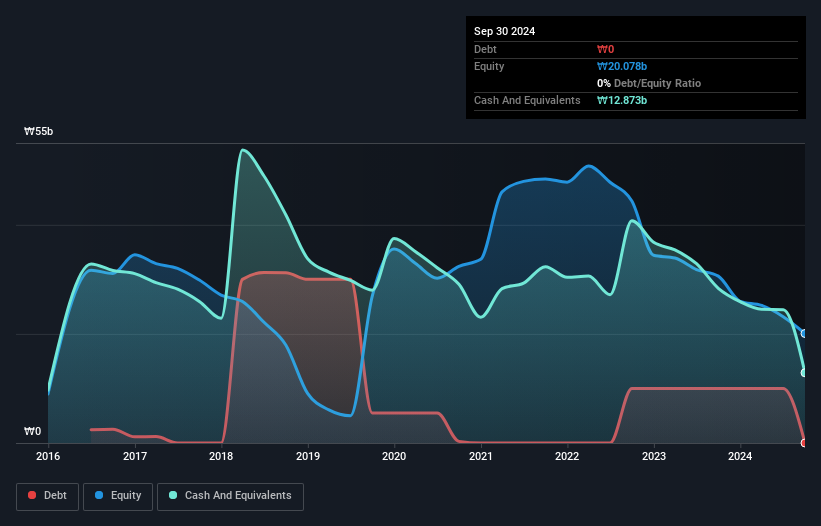- South Korea
- /
- Entertainment
- /
- KOSDAQ:A208640
Here's Why We're Not Too Worried About Thumbage's (KOSDAQ:208640) Cash Burn Situation
Just because a business does not make any money, does not mean that the stock will go down. For example, biotech and mining exploration companies often lose money for years before finding success with a new treatment or mineral discovery. But while history lauds those rare successes, those that fail are often forgotten; who remembers Pets.com?
So should Thumbage (KOSDAQ:208640) shareholders be worried about its cash burn? In this report, we will consider the company's annual negative free cash flow, henceforth referring to it as the 'cash burn'. Let's start with an examination of the business' cash, relative to its cash burn.
Check out our latest analysis for Thumbage
Does Thumbage Have A Long Cash Runway?
A company's cash runway is the amount of time it would take to burn through its cash reserves at its current cash burn rate. When Thumbage last reported its September 2024 balance sheet in November 2024, it had zero debt and cash worth ₩13b. Looking at the last year, the company burnt through ₩5.9b. Therefore, from September 2024 it had 2.2 years of cash runway. That's decent, giving the company a couple years to develop its business. You can see how its cash balance has changed over time in the image below.

How Well Is Thumbage Growing?
It was fairly positive to see that Thumbage reduced its cash burn by 39% during the last year. Revenue also improved during the period, increasing by 14%. Considering the factors above, the company doesn’t fare badly when it comes to assessing how it is changing over time. In reality, this article only makes a short study of the company's growth data. This graph of historic earnings and revenue shows how Thumbage is building its business over time.
Can Thumbage Raise More Cash Easily?
Even though it seems like Thumbage is developing its business nicely, we still like to consider how easily it could raise more money to accelerate growth. Generally speaking, a listed business can raise new cash through issuing shares or taking on debt. Commonly, a business will sell new shares in itself to raise cash and drive growth. By looking at a company's cash burn relative to its market capitalisation, we gain insight on how much shareholders would be diluted if the company needed to raise enough cash to cover another year's cash burn.
Thumbage has a market capitalisation of ₩48b and burnt through ₩5.9b last year, which is 12% of the company's market value. Given that situation, it's fair to say the company wouldn't have much trouble raising more cash for growth, but shareholders would be somewhat diluted.
So, Should We Worry About Thumbage's Cash Burn?
The good news is that in our view Thumbage's cash burn situation gives shareholders real reason for optimism. One the one hand we have its solid cash burn reduction, while on the other it can also boast very strong cash runway. Considering all the factors discussed in this article, we're not overly concerned about the company's cash burn, although we do think shareholders should keep an eye on how it develops. On another note, Thumbage has 3 warning signs (and 1 which doesn't sit too well with us) we think you should know about.
Of course, you might find a fantastic investment by looking elsewhere. So take a peek at this free list of interesting companies, and this list of stocks growth stocks (according to analyst forecasts)
Valuation is complex, but we're here to simplify it.
Discover if Thumbage might be undervalued or overvalued with our detailed analysis, featuring fair value estimates, potential risks, dividends, insider trades, and its financial condition.
Access Free AnalysisHave feedback on this article? Concerned about the content? Get in touch with us directly. Alternatively, email editorial-team (at) simplywallst.com.
This article by Simply Wall St is general in nature. We provide commentary based on historical data and analyst forecasts only using an unbiased methodology and our articles are not intended to be financial advice. It does not constitute a recommendation to buy or sell any stock, and does not take account of your objectives, or your financial situation. We aim to bring you long-term focused analysis driven by fundamental data. Note that our analysis may not factor in the latest price-sensitive company announcements or qualitative material. Simply Wall St has no position in any stocks mentioned.
About KOSDAQ:A208640
Adequate balance sheet with slight risk.
Market Insights
Community Narratives



